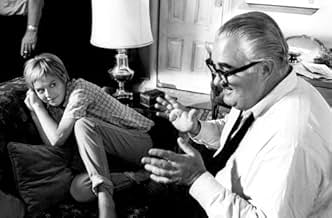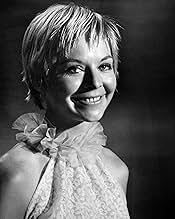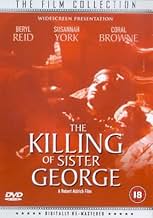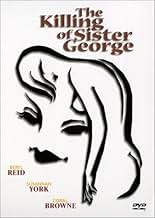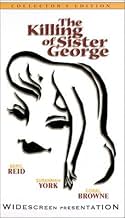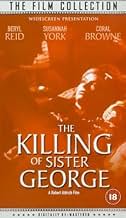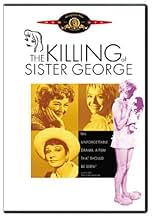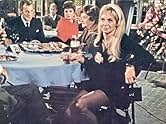NOTE IMDb
7,0/10
2,7 k
MA NOTE
La vie d'une actrice de feuilleton dérape lorsqu'elle commence à craindre que son personnage ne soit exclu de la série.La vie d'une actrice de feuilleton dérape lorsqu'elle commence à craindre que son personnage ne soit exclu de la série.La vie d'une actrice de feuilleton dérape lorsqu'elle commence à craindre que son personnage ne soit exclu de la série.
- Réalisation
- Scénario
- Casting principal
- Récompenses
- 1 nomination au total
Avis à la une
this is a showcase for some magnificent acting....it doesn't seem at all homophobic , but rather immensely poignant and sad...and in what other film do you get to see a great lesbian band in matching sweaters and guitars (good solo!) Difficult at the beginning, just seems shallow and bitchy, but stick with it and watch Beryl Reid's character disintegrate....the final scene reminded me of "The Blue Angel" or "The Entertainer" in its shattering degradation...congrats to Aldrich for having the guts to make this movie, I think it stands the test of time rather well. Coral Browne is also magnificent, and York holds her own. The lesbian bar scene is worth waiting for.
I did not see the stage play upon which this film is based (too young) but, based on its own merits, this film surely deserves a closer look.
The central trio of performers (Reid, York, Browne) provide career "bests" and there are some amusing vignettes from the others (Fraser, in particular, as a truly odious soap actor).
The much-discussed sex scene is, by today's standards (and, it would seem, even those of the 1960s stage play), tame, but its real value as a display of the shift of power between the three central characters is very neatly worked through in the closing quarter.
The final five minutes of (self-) destruction is heartbreaking, with excellent use made of the music track.
In short: miss it and miss out.
The central trio of performers (Reid, York, Browne) provide career "bests" and there are some amusing vignettes from the others (Fraser, in particular, as a truly odious soap actor).
The much-discussed sex scene is, by today's standards (and, it would seem, even those of the 1960s stage play), tame, but its real value as a display of the shift of power between the three central characters is very neatly worked through in the closing quarter.
The final five minutes of (self-) destruction is heartbreaking, with excellent use made of the music track.
In short: miss it and miss out.
I don't give many movies 10/10, but this black comedy-drama gets my vote, for fine acting, production values, and of course its place in movie history in the frank portrayal of lesbian relationships.
Others have & will comment on the latter, so I'll point out some of the other aspects of this fine film. The combination of comedy with personal tragedy poses difficult problems both for the writer & director; here they both succeed brilliantly.
The three principals' performances are riveting. I particularly liked the ambiguity of Coral Brown's portrayal of Mercy Croft; watch her carefully in the tight closeups in the gay club, and notice how the down-turned mouth at times hides a hint of a self-satisfied smile.
The cinematography deserves special mention. The use of colour is beautiful; I was reminded of "The Umbrellas of Cherbourg", but it never steps over the line into unreality. On the contrary, the alleys of London, the TV studio and above all the stairs and corridor of the flat are supremely realistic. Most unusual is the use of chiaroscuro, the interplay of light-and-shadow, seldom seen outside of black & white films. In so many colour films the light appears to come from some amorphous omnidirectional source out of science fiction; great for lighting everything and everybody evenly, but unrealistic and DULL. Look at the shadows as Beryl Reid ('George') enters the apartment building and climbs the stairs, or in some of the bedroom scenes. Apart from its other many virtues, this movie held my attention as a fine piece of film-making.
All in all, a masterpiece; my one regret is that it was shown on TV in pan-and-scan. It IS now available in DVD - in several formats & regions - so I look forward to watching it again in its original form.
Others have & will comment on the latter, so I'll point out some of the other aspects of this fine film. The combination of comedy with personal tragedy poses difficult problems both for the writer & director; here they both succeed brilliantly.
The three principals' performances are riveting. I particularly liked the ambiguity of Coral Brown's portrayal of Mercy Croft; watch her carefully in the tight closeups in the gay club, and notice how the down-turned mouth at times hides a hint of a self-satisfied smile.
The cinematography deserves special mention. The use of colour is beautiful; I was reminded of "The Umbrellas of Cherbourg", but it never steps over the line into unreality. On the contrary, the alleys of London, the TV studio and above all the stairs and corridor of the flat are supremely realistic. Most unusual is the use of chiaroscuro, the interplay of light-and-shadow, seldom seen outside of black & white films. In so many colour films the light appears to come from some amorphous omnidirectional source out of science fiction; great for lighting everything and everybody evenly, but unrealistic and DULL. Look at the shadows as Beryl Reid ('George') enters the apartment building and climbs the stairs, or in some of the bedroom scenes. Apart from its other many virtues, this movie held my attention as a fine piece of film-making.
All in all, a masterpiece; my one regret is that it was shown on TV in pan-and-scan. It IS now available in DVD - in several formats & regions - so I look forward to watching it again in its original form.
Anyone who likes gritty, clever, slightly comical drama should see this one. The plot is simple enough - an alcoholic gay actress worried about her future in a top Coronation Street-style soap opera - but the way the film is put together is pithy without being too complex - the characterisations are brilliantly satirical, showing up the worst side of the soap opera industry and its catty, backstabbing nature. You don't find yourself feeling sorry for anyone at the end of it apart from perhaps Susannah York. Lots of London-in-the-1960s location filming and familiar faces - I'm only surprised that John Le Mesurier doesn't appear in it. In a word - absorbing. Why don't they make them like this anymore?
This movie is a heck of a lot more relevant than more recent films dealing with lesbianism -- the shallow, lame DESERT HEARTS comes to mind. Though over two hours long, TKOSG held me with little effort. The action moved freely from the studio to the apartment to the pub. And the seduction scene was totally erotic and ... well ... never mind. Was this particular scene overly long? Only to a generation raised on sex scenes which rarely last as long as it takes to cook a three-minute egg. Explicit? Grow up!
And the performances ... wow! I had no problem with the hold George had over Childie, with Beryl Reid's superior portrayal complemented perfectly by Susannah York's fragile and, at the same time, forceful Childie. I must admit, York was a bit over the top in the beginning, but I wouldn't say that if I didn't count her as one of my all-time favorite actresses. And how about Coral Browne -- she was sensational! Sublty menacing, eerily sensuous -- and when I realized this was the same woman from AUNTIE MAME and LYLA CLARE, well, I nearly fell off my chair. I love this lady!
And the performances ... wow! I had no problem with the hold George had over Childie, with Beryl Reid's superior portrayal complemented perfectly by Susannah York's fragile and, at the same time, forceful Childie. I must admit, York was a bit over the top in the beginning, but I wouldn't say that if I didn't count her as one of my all-time favorite actresses. And how about Coral Browne -- she was sensational! Sublty menacing, eerily sensuous -- and when I realized this was the same woman from AUNTIE MAME and LYLA CLARE, well, I nearly fell off my chair. I love this lady!
Le saviez-vous
- AnecdotesThe lesbian lovemaking scene so disgusted Robert Aldrich's longtime composer friend Frank De Vol that he quit the production and didn't work with Aldrich for several years.
- GaffesWhen George asks for a pint of beer the waiter arrives with it on a tray and it is half full with half a glass of head but when he puts it on the table it's much fuller, with only about an inch of head on it.
- Crédits fousDuring the opening credits, the picture distractingly flips from left to right as the main character travels through claustrophobia-inducing alleyways.
- ConnexionsFeatured in Before Stonewall (1984)
Meilleurs choix
Connectez-vous pour évaluer et suivre la liste de favoris afin de recevoir des recommandations personnalisées
- How long is The Killing of Sister George?Alimenté par Alexa
Détails
- Date de sortie
- Pays d’origine
- Langue
- Aussi connu sous le nom de
- Le prix de la gloire
- Lieux de tournage
- Sociétés de production
- Voir plus de crédits d'entreprise sur IMDbPro
- Durée
- 2h 18min(138 min)
- Mixage
- Rapport de forme
- 1.85 : 1
Contribuer à cette page
Suggérer une modification ou ajouter du contenu manquant


